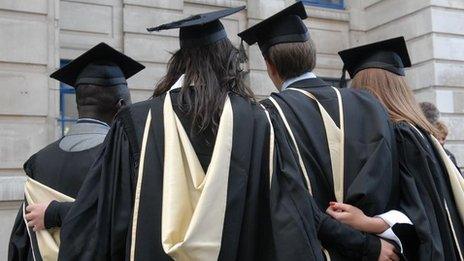'Fewer university offers' for minority groups
- Published

Ethnic minority students are less likely than their white British peers to receive offers from UK universities, research suggests.
A study, by the London School of Economics and Political Science (LSE), analysed university applications made in 2008 by 50,000 would-be students.
Degree applications from 12 minority groups analysed were "significantly" less likely to result in an offer.
Universities UK said institutions were "actively addressing" the issue.
The report found that even after academic achievement, family social background and the type of school a student attended were taken into account, most minority groups were still much less likely to win a university place.
The only exceptions were mixed white/Asian and Chinese university candidates, who did not have a significantly lower chance of getting an offer.
The academics calculated that on average, Pakistani candidates received seven fewer offers for every 100 applications compared with white British applicants, whilst Bangladeshi and black African students received five fewer offers and black Caribbean youngsters received three fewer.
The research also found that around 71% of applications from white British students to elite institutions - those with the most competitive entry requirements - resulted in an offer, more than for any other group.
At the other end of the scale, around 49% of applications to these universities from Bangladeshi students resulted in offers, along with 52% of those from Pakistani young people.
'Marked differences'
The LSE researchers also looked at the types of universities to which different ethnic groups were likely to apply.
They found that once qualifications, socio-economic status and schooling were taken into account, there was "very little" evidence that candidates from black and minority ethnic groups were reluctant or unwilling to apply to high-status institutions.
"When other variables are taken into account, candidates from most black and minority ethnic groups are just as, if not more, likely to target elite universities than comparable white British candidates," the report concludes.
All the applications examined by the LSE researchers were under 21 years of age and had a minimum of two A-levels or equivalent qualifications.
Dr Michael Shiner, an associate professor at the LSE's department of social policy, said: "We know that students from black and minority ethnic groups go to university in good numbers, but our analysis raises concerns about the fairness of the admissions process.
"Even when we take account of A-level grades, candidates' chances of receiving an offer vary according to their ethnicity, the type of school they attend and their family background. For some candidates these factors combine to create quite marked differences.
"Although the vast majority of applicants do eventually get a place at university, non-academic factors influence the offers they receive and the choices that are available to them."
A spokesman for Universities UK said: "This is a complex and challenging issue which universities are actively addressing.
"Offer rates are largely explained by applicants' previously attained grades and the course's popularity, but factors such as subject choice at A-level, information advice and guidance received and patterns of application by subject are all factors that can play a role.
"The application figures in question relate to the 2008 application cycle and the higher education system has seen significant changes over the last six years."
- Published14 March 2014
- Published3 December 2013